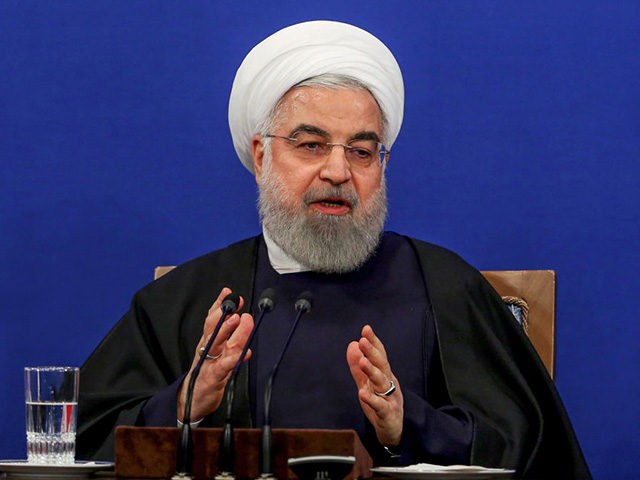Iranian President Hassan Rouhani ordered his country to “take the issue of coronavirus seriously” on Wednesday, striking a contrasting tone with Supreme Leader Ayatollah Ali Khamenei, who last week described the Chinese viral outbreak as “not such a big tragedy.”
Rouhani asserted in remarks during a cabinet meeting that “the entire government is playing a role” in responding to the crisis, according to Iranian state media.
The Chinese coronavirus, originating in the centrally located Wuhan metropolis, reached Iran via unknown means and was first detected in Qom, a city of religious significance to Shiite Muslims. It has since infected at least 9,000 people in the country — the official government tally, but a tally dissidents and whistleblowers in the Iranian healthcare system have repeatedly challenged as too low.
Iranian officials have speculated publicly that the virus is a biological weapon of Israeli origin meant to destroy the Iranian economy.
“Everybody must take the issue of coronavirus seriously,” Rouhani reportedly demanded at Wednesday’s meeting, according to Iran’s Tasnim news agency. “The administration members are doing their best to minimize the COVID-19 tolls on the economy and people’s lives.”
He noted that the Iranian new year holiday, Nowruz, typically brings with it significant travel and large gatherings, risky activities amid a pandemic. Rouhani described the holiday as “a good opportunity to win the fight against coronavirus.”
“The entire government is playing a role in the committee. There is no individual in our administration that is not engaged,” Rouhani asserted. “Our effort is focused on making people’s lives, which are currently difficult, easier and more tolerable.”
Iran has shifted much of the public health responsibility to the Islamic Revolutionary Guard Corps (IRGC), a U.S.-designated terrorist organization with no significant medical expertise. Fars News, a state-run outlet, relayed an announcement from IRGC Brig. Gen. Ramezan Sharif Wednesday that over 100,000 IRGC terrorists had been “mobilized” to contain the virus.
Sharif “underlined the IRGC experiences during the eight years of Iraqi-imposed war against Iran as well as helping the Resistance Front in recent years to confront the chemical attacks by the enemies of the Islamic Ummah and using the experiences in Iran’s fight with coronavirus,” according to Fars.
“The IRGC’s extensive system, including personnel and specialized capacities as well as stationary and field hospitals, care camps, medical centers, and relief and sanitary items and equipment available in the IRGC and Basij are available for the specific circumstances of the country in the fight against coronavirus,” Sharif reportedly said.
Iranian officials also claim that the country has produced four tons of hand sanitizer and 76,000 masks to help stop the spread of the virus.
The dramatic escalation in emergency measures appears to contradict the calm that Khamenei urged last week. In remarks during a tree-planting ceremony, Khamenei applauded the “jihad” that the nation’s health workers had embarked upon against the virus but insisted that the nation had overcome greater challenges than an outbreak that the World Health Organization would, a week later, brand a pandemic.
“In my opinion, this is not a very grave calamity and there have been graver ones. I myself have witnessed instances of these calamities,” Khamenei said. “Of course, I do not want to understate its importance, but we should not exaggerate it either. An incident has taken place which will last for some time — but by Allah’s favor, it will not be very long. It will exist in the country for some time and it will disappear after a while.”
Khamenei said Iranians “can eliminate many problems by praying, by supplicating, by relying on the immaculate Imams (greetings be upon them) and asking them to intercede on their behalf and by referring to the Holy Prophet of Islam.”
Dissident networks within the country have challenged those numbers, citing health workers in the country. The People’s Mojahedin Organization of Iran (PMOI/MEK), the largest Iranian dissident group operating inside the country, estimated that 3,000 people had died as of Tuesday nationwide, a much larger number than the official estimate. MEK cited not just its members working clandestinely to gather information, but a growing list of Iranian Parliament members objecting to the regime not doing enough to protect public figures. At least 23 lawmakers have tested positive for coronavirus so far.
“The towns of Rudsar and Amolesh [northern Iran] each have one hospital and they are reporting dire conditions. Equipment and supplies are very low. They are running out of first aid and emergency supplies,” lawmaker Assadollah Abbasi protested, according to MEK. “The hospital in Rudsar where coronavirus patients are held has no oxygen generator/concentrator or CAT scan devices. This hospital is now full and cannot accept new patients. Gloves and masks are donated by ordinary people.”

COMMENTS
Please let us know if you're having issues with commenting.